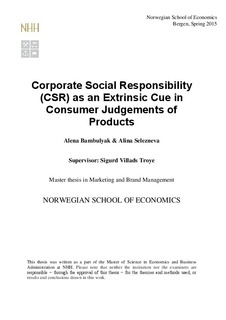Corporate Social Responsibility (CSR) as an extrinsic cue in consumer judgements of products
Master thesis
Permanent lenke
http://hdl.handle.net/11250/300677Utgivelsesdato
2015Metadata
Vis full innførselSamlinger
- Master Thesis [4372]
Sammendrag
This research paper combines two streams of research, Corporate Social Responsibility (CSR) and its influence on consumers, and research on extrinsic cues as an input in consumer evaluations of products and especially food items. We have identified a gap in the literature that we tried to cover with this research. There has only been an attempt to study the effect of CSR information on consumer evaluations of product´s taste, specifically that of chocolate (Shang, 2015). However, this attempt has not resulted in a published article yet.
Thus, we decided to make a small contribution to the academic world and bridge the knowledge gap. The purpose of this paper was to find out whether CSR information acts as an extrinsic cue in consumer evaluations of food items. Moreover, we wanted to replicate findings of other researchers and see whether CSR information influences consumer company evaluations and whether this relationship is moderated by stated personal support of the CSR domain. Also, we wanted to find out whether CSR information affects consumer attitudes towards buying products of the company.
In order to achieve the goal we conducted a cheese tasting between-subjects experiment with a questionnaire and ran it at NHH’s premises with 75 participants. Subjects were exposed to either positive/negative/no CSR information in the company description, tasted the cheese sample and completed the questionnaire.
We found that CSR information has an effect on company evaluation and attitude towards buying products from the company. Moreover, stated personal support of the CSR domain does not affect the relationship between CSR information and company evaluation. Also, CSR information in the company description does not affect consumer taste evaluations and the relationship is not moderated by taste ambiguity.
